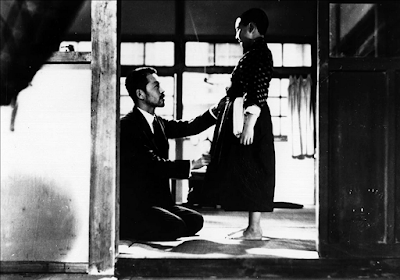Made while Japan was under American occupation, this has been dismissed and even Ozu disliked it. A somber film missing his usual gentle humour and - unusually for him - there are two scenes of violence.
Dressmaker Tokiko struggles to survive in post-war Tokyo; living in a single room with her young son Hiroshi, she longs for her husband Shuichi's return from the army.
Hiroshi is suddenly hospitalized for ten days and faced with the large hospital bill, Tokiko has no other option but to prostitute herself for one night.
Shuichi returns but any happiness ends when Tokiko decides to tell him what happened. His anger matches her shame and he refuses to forgive her.
Shuichi visits the brothel Tokiko had used and meets Fusako, a young prostitiute. Through her he realises what the post-war conditions are forcing women to choose.
But is there any chance he will forgive Tokiko?
Shelf or charity shop? This is on the same DVD as a far superior Ozu film so I will keep it on the shelf. It is not one of my personal favourites but I can appreciate the performances of Shuji Sano as the conflicted Shuichi although Kinuyo Tanaka's Tokiko is a bit one-note in her despair. There are fine performances from Chieko Murata as Tokiko's disapproving friend Akiko and Chiyoko Fumiya as the young prostitute Fusako. It is a joy as always to find Ozu-san's favourite actor Chishu Ryu in the supporting role of Shuichi's understanding boss Satake - it was only six years earlier Ryu and Sano had played father and son in Ozu's CHICHI ARIKI (THERE WAS A FATHER).
.png)

.png)


.png)















